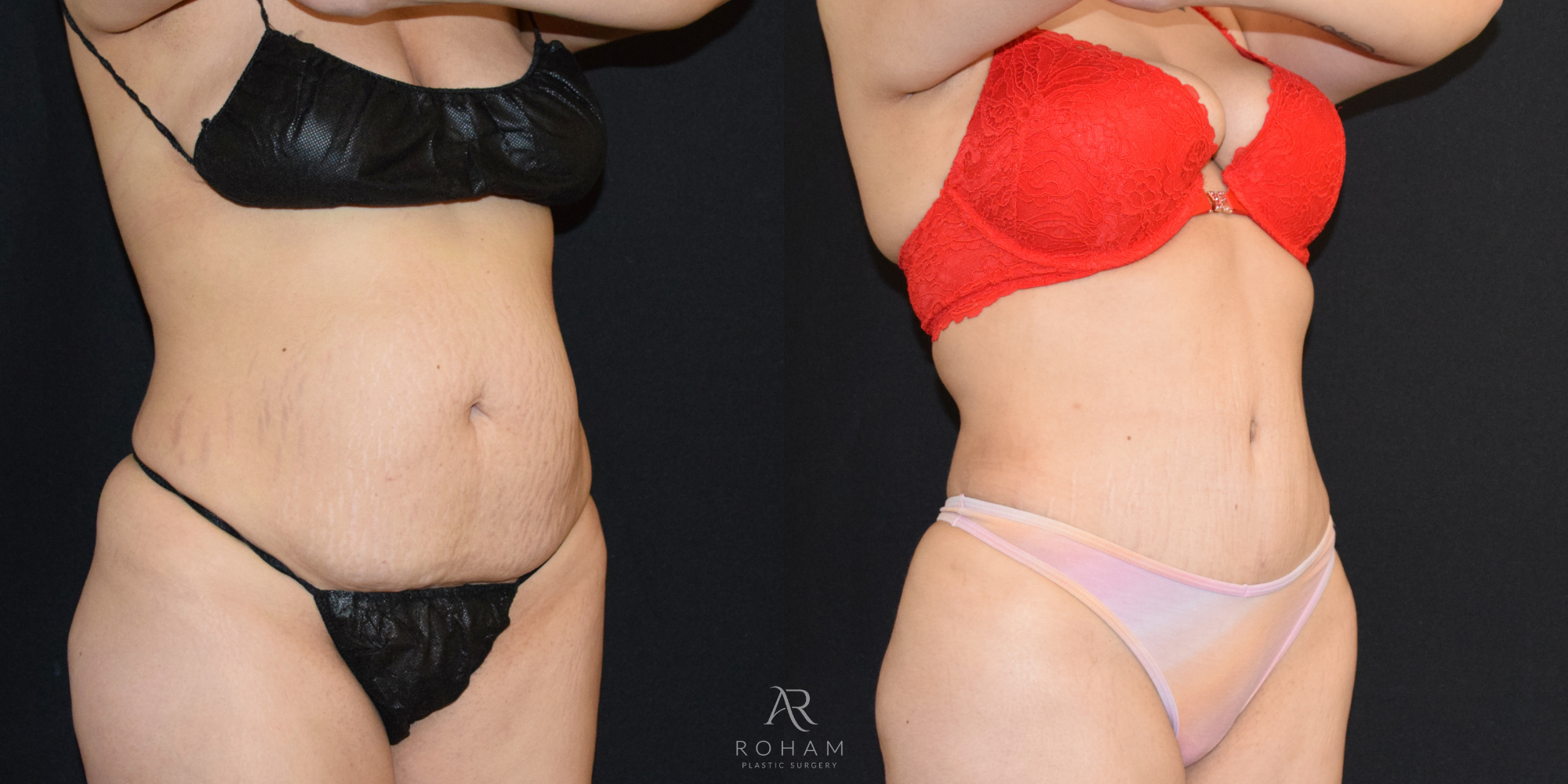Tummy Tuck in Newport Beach
Conveniently located to serve Newport Beach and the surrounding areas of Orange County, Huntington Beach, Costa Mesa, and Irvine
Book a consultation

Tummy Tuck Overview
Pregnancy and significant weight loss create physical changes that diet and exercise simply cannot reverse. The separated rectus muscles (diastasis recti), excess skin with compromised elasticity, and stubborn fat deposits represent structural modifications rather than fitness shortcomings that need addressing.
Tummy tuck surgery, medically known as abdominoplasty, addresses the root causes of abdominal contour problems by repairing separated muscles, removing excess skin, and eliminating resistant fat deposits. This procedure restores both function and form to your core, correcting issues that require surgical intervention to properly resolve.
Dr. Ali Roham brings a comprehensive surgical background to abdominoplasty that extends well beyond cosmetic training. His expertise in managing challenging surgical cases translates directly to the meticulous tissue handling and attention to detail that produces natural-looking, long-lasting outcomes.
Tummy Tuck Before and After Photos
Dr. Roham's surgical portfolio reflects his commitment to creating abdominal contours that look naturally toned rather than artificially tight, with particular attention to maintaining appropriate curves and avoiding the "pulled" appearance that can result from overly aggressive tissue removal or muscle tightening.
View Tummy Tuck Gallery
Why Choose Dr. Roham for Your Tummy Tuck?
The complexity of abdominoplasty requires more than cosmetic surgery training – it demands the kind of comprehensive surgical expertise that Dr. Ali Roham developed through years of general surgery residency where he managed trauma cases, complex abdominal procedures, and emergency situations requiring precise anatomical knowledge and technical skill under pressure. This foundation proves invaluable when performing tummy tucks, where muscle repair, tissue handling, and understanding of abdominal anatomy directly impact both safety and aesthetic outcomes.
Learn more about Dr. Roham
Our Patients Are Saying...



What is a Tummy Tuck?
Abdominoplasty is a surgical procedure that addresses three distinct anatomical problems that contribute to poor abdominal contour: weakened or separated rectus abdominis muscles (the "six-pack" muscles), excess skin that has lost elasticity, and localized fat deposits that don't respond to diet and exercise. Each of these issues requires a different surgical approach, which is why tummy tuck surgery involves multiple components performed during a single procedure.
The muscle repair component, called rectus plication, involves suturing the separated muscle bellies back together to recreate the natural corset-like support structure of your core. This internal repair work is crucial for both aesthetic results and functional improvement, as the restored muscle wall provides better core stability and can help alleviate some types of lower back pain.
Skin removal addresses the excess tissue that remains after pregnancy or weight loss, when the skin has been stretched beyond its ability to contract naturally. Dr. Roham carefully plans incision placement to minimize visible scarring while removing the appropriate amount of tissue to create smooth, natural-looking contours without over-tightening that could compromise healing or create an unnatural appearance.
The procedure typically includes strategic fat removal through direct excision or liposuction to refine the final contours and create the most harmonious result possible. Dr. Roham's approach integrates all these components seamlessly, understanding that the best abdominoplasty results come from addressing each anatomical issue with the appropriate technique while maintaining proper blood supply and tissue viability throughout the healing process.

Ideal Candidates for Tummy Tuck
The most successful tummy tuck outcomes occur in patients who meet specific medical and physical criteria that optimize both safety and results:
Completed childbearing (pregnancy after tummy tuck can compromise results)
At or near stable target weight (not a weight loss procedure)
Good overall health with well-controlled medical conditions
Non-smoker or able to quit smoking for the required period
Realistic expectations about scarring and recovery time
Adequate support system for recovery assistance
Dr. Roham conducts thorough medical evaluations to ensure surgical candidacy, including assessment of any medical conditions that could impact healing, review of current medications that might affect bleeding or recovery, and discussion of lifestyle factors that influence surgical outcomes.
Find out if you're a candidate for tummy tuck surgery. Call (949) 269-7990 to book your consultation with Dr. Ali Roham.

Benefits of a Tummy Tuck
Repair of diastasis recti (separated abdominal muscles) that exercise cannot correct
Removal of excess skin that has lost elasticity due to pregnancy or weight loss
Improved core strength and stability through muscle repair
Enhanced abdominal contours that complement natural body proportions
Increased confidence in clothing choices and physical activities
Medical research has documented functional benefits beyond aesthetic improvement, including reduced stress urinary incontinence symptoms in women who have given birth and improved posture through restored core muscle function.
Interested in learning more about the benefits of tummy tuck surgery? Schedule your consultation to discuss your specific situation with Dr. Roham.
Schedule your consultationTypes of Tummy Tuck Techniques


Recovery after Tummy Tuck Surgery
Weeks 1-2:
Limited mobility with restricted bending and lifting
Drainage tubes managed according to specific instructions
Compression garment worn continuously except during showering
Pain managed with prescribed medications as needed
Gradual increase in walking to prevent blood clots
Weeks 3-6:
Gradual return to light activities and non-strenuous work
Continued compression garment use as directed
Progressive improvement in comfort and mobility
Follow-up appointments to monitor healing progress
Months 2-6:
Clearance for exercise and normal physical activities
Continued improvement in abdominal contour as swelling resolves
Scar maturation and fading begins
Final results become apparent
Dr. Roham provides detailed written post-operative instructions specific to your procedure, with 24-hour availability for questions or concerns during recovery. He schedules regular follow-up appointments to monitor healing progress, remove sutures or drains as appropriate, and ensure you're progressing normally through each phase of recovery. For more information, you can read our tummy tuck recovery guide.

Insurance Coverage for a Tummy Tuck
Cosmetic abdominoplasty is not covered by health insurance plans, as it's considered an elective aesthetic procedure. However, in rare cases where muscle repair is performed to address documented functional problems such as severe diastasis recti causing chronic pain or dysfunction, insurance coverage might be available with proper medical documentation and pre-authorization.
Cost of a Tummy Tuck
Abdominoplasty pricing reflects the complexity and customization required for each individual case, with costs varying based on the specific technique required, whether additional procedures are performed simultaneously, and the extent of correction needed to achieve your desired results.
To make tummy tuck surgery more accessible, we offer financing options that allow you to break the cost of surgery into affordable monthly payments, making it easier to proceed with your procedure when you're ready rather than waiting to save the full amount.
During your consultation, you'll receive detailed cost information tailored to your specific treatment plan.
Get pricing information

Frequently Asked Questions


How long do tummy tuck results last?
Results are permanent regarding muscle repair and skin removal, though future pregnancy or significant weight gain can compromise outcomes. Maintaining stable weight preserves results indefinitely.
Can I get pregnant after a tummy tuck?
Yes, pregnancy is safe after abdominoplasty, but it will likely compromise your results by re-stretching repaired muscles and skin. Most surgeons recommend completing childbearing before having the procedure.
What's the difference between a tummy tuck and liposuction?
Liposuction removes fat only and works best with good skin elasticity. Tummy tuck addresses muscle separation, removes excess skin, and includes fat removal when needed. Many patients require both components for optimal results. Read more about tummy tuck vs liposuction.
How noticeable will my scar be?
The scar extends horizontally across the lower abdomen at the bikini line level. While permanent, most scars fade significantly over 12-18 months and remain hidden under normal underwear or swimwear.
When can I exercise after my tummy tuck?
Light walking begins immediately after surgery. Most exercise can resume around 6-8 weeks, with full unrestricted activity typically cleared by 10-12 weeks, depending on healing progress.
Can a tummy tuck help with back pain?
Some patients experience improvement in lower back pain related to weak core muscles, as the muscle repair component can restore core stability. However, this isn't the primary purpose of the procedure.
Can men have tummy tuck surgery?
Absolutely. Men commonly seek abdominoplasty after weight loss or to address genetic predisposition to abdominal fat and skin laxity. Techniques are modified to maintain masculine abdominal contours.
What are the risks of tummy tuck surgery?
Like all surgery, abdominoplasty carries risks including bleeding, infection, poor wound healing, asymmetry, and anesthesia complications. Serious complications are rare when performed by qualified surgeons in accredited facilities.
Will I need drains after surgery?
Most abdominoplasty procedures require temporary drainage tubes to prevent fluid accumulation during early healing. Dr. Roham will explain drain management and removal timing based on your specific procedure and healing progress.




